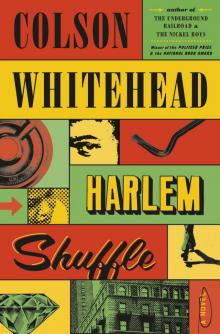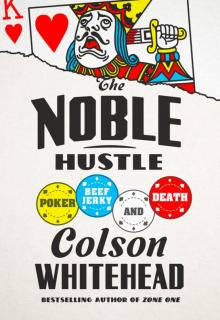- Home
- Colson Whitehead
The Intuitionist Page 20
The Intuitionist Read online
Page 20
“Maybe you should develop what you have,” Lila Mae says, “and use different film for Chancre and Lift. That way you won’t lose everything if something happens.”
His face shrinks a little. The red neon of the liquor store sign across the street flashes on his face, off and on. “Yeah, you’re right. I’ll take this down tomorrow.”
Did she sound like a scold? Lila Mae thinks. She was only trying to be practical. “Just in case,” she says in soft tones, “is all I’m saying.”
“No, you’re right. I’ll do that.”
“Are you sure they’re in the Department? They might have taken them somewhere.”
“I’ll find them,” Natchez says. “If they’re there, I’ll find them, and if they’re somewhere else, I’ll find where that place is. You worry about what you got to do and I’ll worry about what I got to do.”
“I’ll tell you what—after I talk to Pompey, I’ll go to Lift and try to find where their copies are. That way, we’ll save time.”
He looks cross, Lila Mae thinks. As cross and defiant as she looked when he insisted on coming to Pompey’s with her? He says, “I’ll do it, Lila Mae. That’s the agreement, right? You got enough to do. When I get the film developed, you can help me figure out what my uncle was saying. Okay?”
She wishes she hadn’t tried to tell him what to do. She has been misinterpreted. “Natchez—do you want to get something to eat?”
He frowns. “I’d really like that,” he says, “but I have to get back on the train. I have a long day tomorrow.” He stands and pushes the chair back to where he found it. “I know you one of these modern city gals, Lila Mae, but me, I like to take it slow. You know? It’s just how I was raised. Let’s—let’s go out tomorrow night for real. After we finish our business let’s go out and do it right. No elevators, no black box, no uncle. Just us. We can go out to dinner and then maybe you can take me out to one of these clubs you go to.” Natchez smiles. “I got all this salary from Mr. Reed and it’s just been burning a hole in my pocket.”
“I’d like that,” Lila Mae says.
In the doorway, he quickly kisses her cheek. “Good night, Lila Mae,” he says. “And keep this door locked if you ain’t going to move to a nicer place.”
The modern city girl locks the door behind him.
* * *
“I know what you did,” she tells Pompey. “I know what you did to the Fanny Briggs stack.”
She has been here since this morning, kneading the rubber grooves of the floormat with her shoes. Lila Mae was surprised to learn that Pompey lived only two blocks from her apartment, but in their history they rarely exchanged beyond terse office communiqués (never have Done with that stapler? and The new Board up? been pronounced with such venom). Just two blocks away from her apartment at the Bertram Arms and it could be a different neighborhood. The life here, the ambient cheer of this easy Saturday afternoon: she associates it with her childhood, Southern skies above the myriad taffy pleasures of colored town. On her street she is anonymous; the Caribbean immigrants share a code, a broad and secret choreography she is excluded from. But these are American colored. As the afternoon unfurls outside her car window, each neighbor greets a neighbor, hats are doffed extravagantly, smiles are currency, no strangers. A toddler strays two steps from her mother and almost falls, virgin knees to the pavement, if not for the sure hand of Mr. So-and-So from up the street, who never leaves the street, who always has a redemptive hand or hard candy or arcane wisdom for the children. The mother thanks him, promises a pie. (All nefaria kept behind apartment walls, saved for inside. The neighbors hear everything but do not interfere, squirreling away every curse and blow as gossip for lean hours.)
The street’s breezy vignettes divert Lila Mae on her stakeout outside Pompey’s tenement. The man in the red hat who leans against a lamppost on the corner, his quick hands. The average time it takes for a shopper to complete transactions at the corner grocery (seven minutes). He does not leave his house. She knows he’s in there because he answered the phone. (She let him hear her breathe.) She spends hours gathering herself: imagines vaulting up the gray stone steps, ringing the buzzer for apartment 3A.
A stickball game erupts out of nowhere, quick as a summer shower, in the time it takes her to glance from Pompey’s stoop to her pocket watch. Ten screaming kids, half a broom, a stained canvas ball. Apparently her car is third base, she discovers when one of the boys slaps her trunk, safe. Startled, she turns in her seat and his round, dizzy face is in the window: “Sorry, lady!” he squeals. Your mama’s so black she, you throw like a girl, nuh-uh he didn’t tag me I got there first.
The stickball game disappears as fast as it came, the boys skid off to some new and suddenly pressing pastime. Lila Mae has decided, now, when the door to 327 opens. Pompey holds the door for a squat, round woman in a bright blue dress and two young boys who swat each other noisily. The Family Pompey. She’d assumed he was married—Pompey has a good city paycheck and is not the type to raise hell of any kind, adulterous or alcoholic or what have you—but hadn’t factored in the kids. They look about five or six, short-limbed kinesis. Mrs. Pompey is in the unfortunate habit of dressing her loins’ issue in the same-colored clothes, just one size apart. Perhaps that is why they beat at each other, slapping each newly undefended quarter on his antagonist’s tiny person. Pompey looks down, scowls and clenches his sons’ shoulders. In unison their heads incline toward his hands, a common response to shoulder pinching, Lila Mae has noticed, instinct ushered in aeons ago by the opposable thumb of some slope-browed hominid patriarch. They stop fighting, stop squirming once their father releases his grip and instructs them to behave. The boys make it down the stoop to the sidewalk without incident as Pompey kisses his wife goodbye on the lips. She hadn’t considered that either, a tender side to Pompey, her prey today. It affects her somehow, she pushes the image aside. She has business with the man.
While his family makes their way around the corner, Pompey sits on the front stoop and withdraws a cigar from his shirt pocket. She allows him two blue drags, then eases out of the Department sedan and climbs the steps before he can notice her approach. She’s standing over him when she interrupts his unknowable petty meditations with a terse “I know what you did.”
“Watson? What are you doing here?” He chokes on the smoke, as surprised by the sight of Inspector Watson at his front door as by the unlikely image of her in a dress. (Her mother made it years before. Large roses float on white fabric, tight on her body without a single unseemly curve. She hasn’t worn it in years, never had occasion to. Never met someone like Natchez, whom she will meet later this evening after they have finished their missions. If she presses her nose to the dress, Lila Mae imagines she can smell her mother’s sweat, deep in the cotton.)
“I know what you did to the Fanny Briggs stack. I know Chancre ordered you to do it,” she says flatly.
“I don’t know what the hell you’re talking about, girl.” His face curdles. “Now why don’t, you get away from my stoop before I get on the phone to IAB and tell them that their public enemy number one has finally shown up?” He glances quickly up and down the street to see which of his neighbors is cataloging this incident.
She thinks, he’s probably wondering if he has time to sneak inside his door and slam it behind him. Nope. “Now you listen to me, old man,” leaning over him, “I’m the one in control here now. I saw you go into Shush’s clubhouse and I saw you in your little repairman’s uniform go up to 366 Eighth Avenue. You’ve been cleaning up after Shush’s maintenance gang, making sure they pass inspection so that Shush’s criminal activities don’t attract any undue attention from the Feds.” Pompey leans back beneath this barrage, and Lila Mae leans even closer, tart smoke scoring her nostrils. “I know Shush owns 366—and the shoddy work his boys do on elevators would be just the FBI’s perfect excuse for a raid if he’s not taking care of Department citations.” She drops the pictures of him leaving Pauley’s Social Club, entering and leavin
g 366 in the Growley Elevator Repair uniform, into his lap. “You’re Chancre’s boy. Now if you don’t give it up on what went down at Fanny Briggs, I’ll be the one calling IAB. And the Feds.”
“I didn’t have anything to do with Fanny Briggs,” he says, head shaking furiously, trying to shake away what he sees in the photographs. “I didn’t have anything to do with it.”
“You know what, Pompey? I’m really tired of people telling me lies. I’m through kidding with you people.”
“ ‘You people’? And just what people would that be?”
“You don’t have to shuffle for me, Pompey. I know your game.”
“I didn’t do nothing to Number Eleven. I don’t know what happened. If you want to call IAB or the police, you go ahead and do it. Because I didn’t do anything to Fanny Briggs.”
She pulls back. This man is incredible. “You’d cover for them? You’d go to jail to protect them, after all they’ve done to you?”
He pulls his suspenders off his flesh as if they were chains, lets them snap back. Pompey holds his cigar in front of his eyes and stares at the smoldering red tip. “This is one of Chancre’s cigars,” he says. “Chancre’s. They taste like shit but they got a Spanish label so no one says anything. We all know they taste like shit but we smoke them anyway because he gave them to us.” He looks up at her now. His eyes are cracked with red lines. “I do his work. We all do. Three months ago, the man calls me into his office. I don’t know what he wants. I’ve never spoken to him even though I been there longer than most of those white boys. He asks me if I need money. I tell him, sure—he’s the boss, maybe he’s going to give me that raise I been asking for. He asks me if I heard anything about his friendship with Johnny Shush. ‘Friendship’ he calls it, with his big feet up on the desk like I don’t know what’s going on. Like I’m some dumb nigger. I say yeah, there are rumors, the boys talk about it. Then he asks me again if I need any money and how I could make some looking after Shush’s maintenance crews, because they always do a bad job—none of them seen a machine room in their lives before they became repairmen—and Shush’s got to keep a low profile because of this federal probe. He can’t afford to bribe anyone in the Department, not now. All I got to do is look after the buildings that have been red-coded and make sure they make muster when the Department does the follow-up. If Shush’s boys have messed up, which they usually do, I clean it up because I know what the Department is going to be looking for. I needed the money, so I took the job. Been three months I been doing it. Chancre says just three more months and things will have cooled down. So I did it.”
“It’s against the law,” Lila Mae barks. “You took an oath.”
“Don’t talk to me about oath,” he spits. “I got two boys. One five, the other seven. I was raised in this neighborhood. It’s changed. You’ve been watching me all day, I figure. You see them kids play ball? Ten years from now half of them be in jail, or dead, and the other half working as slaves just to keep a roof over they heads. Ten years from now they won’t even be kids playing ball on the street. Won’t be safe enough even to do that. Walk down this street, you can smell the kids smoking that reefer. Right out in the open like they got no shame. You see that young man on the corner in that red hat? He sells it to them. A few years from now, it won’t be reefer he selling but some other poison. My kids won’t be here when that happens. I need money to take them out of here.”
“Why should I believe you, Pompey?” she demands. “You’ve been just as bad as the rest of them ever since I joined the Department. Worse. Laughing at me with them. Most times you laugh harder. If you didn’t do it, then who did Chancre send in?”
“I don’t know anything about it!” He almost stands up, but catches himself and settles for deep glowering. “And you, how am I supposed to act, the way you carry yourself. Like you some queen. Your nose up in the air? I got two kids.”
“Yeah, I heard you. You got two kids. And you shuffle for those white people like a slave.”
“What I done, I done because I had no other choice. This is a white man’s world. They make the rules. You come along, strutting like you own the place. Like they don’t own you. But they do. If not Chancre, then Lever. I was the first one in the Department. I was the first colored elevator inspector in history. In history! And you will never, ever know what hell they put me through. You think you have it bad? You have no idea. And it was because I did it first that you’re here now. All my life I wanted to be an elevator inspector. That’s all I wanted to be. And I got it. I was the first colored man to get a Department badge. They made shit of what I wanted and made me eat it. You had it easy, snot-nose kid that you are, because of me. Because of what I did for you.
“Come up here and piss in my face. I don’t know what you’re looking for, Inspector Watson, but I don’t have it. It’s not here. You have to go someplace else to find it, and that’s your bad news. I remember when this was a mixed block. Had that polack deli on the corner. Now it’s closed down.” He returns his gaze to her. He taps the light ash from his cigar and takes a deep drag. “You can tell them about me. Call the cops or IAB, whatever you want. I’m gonna be here on this stoop until I finish this here cigar I got. And I’m gonna go to work on Monday like I always do and see what happens. Lila Mae Watson or no Lila Mae Watson.”
When she wrenches the car away from the curb, he’s still in the same position. Staring up at the tenement across the street, hands resting on his knees. A thin old gentleman with a wooden cane, on his interminable progress up the street, stops to wave at him, and Pompey returns the greeting. The photographs lie at his feet. Flakes of ash from Chancre’s cigar hitch a ride off the wind, pirouette up and away.
* * *
ST. ROLAND THE CARPENTER, b. Taranto 1179; d. near Naples, 1235. One of the primary sources for Roland the Carpenter’s life is his letters and drawings of fantastic contraptions, of which many were preserved until they were destroyed in a fire in 1873; they give a picture of the man and the conditions in which he worked so unassumingly and selflessly. He was ordained a priest among the parochial clergy at Bologne. He made aborted attempts to become a missionary among the Moslems. This desire had some fulfillment in 1219 when he accompanied the crusaders of Gautier de Brienne to Egypt; he made appeal in person to Sultan Malek al-Kamel, but had no success with either Saracens or crusaders, and after visiting the Holy Land he returned to Italy.
In 1225, while praying in the church of San Febronia, he seemed to hear an image of the Virgin Mary say to him: “Lift the people to His Kingdom.” He took the words literally and developed the belief that churches should have two floors, the bottommost for sacrifices and alms-giving, and the uppermost reserved for prayer. The next year he founded the Order of the Gradual Stair but had little success in finding converts. In search for sinners he penetrated the prisons, the brothels, the galleys, and continued his mission into hamlets, back lands and at street corners. He converted none save one spectacular penitent, a Spanish woman who had murdered her father in a gambling dispute and then disguised herself as a man and served in the French army. It is said he once rescued a family of chickens from a burning barn. A saying of his that has rarely been repeated since is: “Let us take one leg up, and He will carry us the rest of the way.” In 1235, he fell afoul of the local governor for aggressive proselytizing and it was decreed that he should be put to death by a battering of cudgels. His wounds were healed after every blow, whereupon he was burned at the stake. At his funeral all the poor of Naples surrounded the coffin that contained his heart, which had been recovered from the ashes; the peasants had mistaken his procession for that of another holy man who had died the very same night. His emblem in art is three stairs. He is the patron saint of elevator inspectors.
* * *
Such modesty, she thinks. No one wants to take credit for such a handy piece of sabotage. She believes Pompey, and his story jibes with Chancre’s. (She’s a good mile away from her destination, she drives slowly, no rush, only ha
lf her mind on the angry vectors of city traffic.) If they didn’t do it, she muses, then who did—because if no one is responsible then she was negligent. And she is never wrong. Considers: Chancre had no reason to lie. If he was brazen enough to have her kidnapped, to make plain his alliance with Johnny Shush, there is no reason not to admit tinkering with Number Eleven. (Number Eleven, the forgotten victim in this drama, a cab so full of promise, taken from us at such an early age, in the prime of life. Who cries for Number Eleven? So preoccupied is she with how the accident impacts her that Lila Mae never gives a thought to the bereaved, the sobbing assembly line who has lost one dear, who never had a chance to say goodbye.) Pompey. She was so sure about Pompey, that shuffling embarrassment. She files her botched interrogation away. She has an engagement to keep. Lila Mae notices a long black hair lying like a snake on her dress. Drops it out the window.
Pompey is a small man on a dirty stoop in an endless city. She files it away for later. She has a date, and an errand to run before that date. The modern city girl has chosen a restaurant she remembers Chuck describing to her once, a Tiki joint with (reportedly) Hawaiian grass hanging from bamboo fixtures, and lights covered by multicolored globes. They have dancing after midnight, and Lila Mae hopes that this will fulfill Natchez’s expectations of her social life, despite the fact it has been cribbed entire from Chuck’s adventurous forays into the city he has made his new home. She catches her eyes in the sinister rectangle of the rearview mirror: tiny and cold, ancient black meteorites peering out of dirt. She could have been nicer to Natchez last night—after so many poses, couldn’t amiability be a guise as well, removed from the closet hook when necessary? Natchez is new to the city and she remembers her first slow steps on this concrete, looking up at the scuffed knees of the structures girding above her. (The very same buildings that at this moment accelerate sunset. City night precedes real night thanks to these grim monoliths, the merciless fortification they have erected against nature.) Lila Mae thinks, she should be to him what she never had when she arrived here. Simple kindness, a helping hand—so before they meet for dinner she will infiltrate Lift and find Ben Urich’s pages of Fulton’s journal. Red stoplights warn. She stops at the intersection, thinks, she will do what she can to make his mission easier, the discovery of his birthright.

 The Nickel Boys
The Nickel Boys Zone One
Zone One The Underground Railroad
The Underground Railroad The Colossus of New York
The Colossus of New York The Intuitionist
The Intuitionist Apex Hides the Hurt
Apex Hides the Hurt Harlem Shuffle
Harlem Shuffle The Noble Hustle
The Noble Hustle